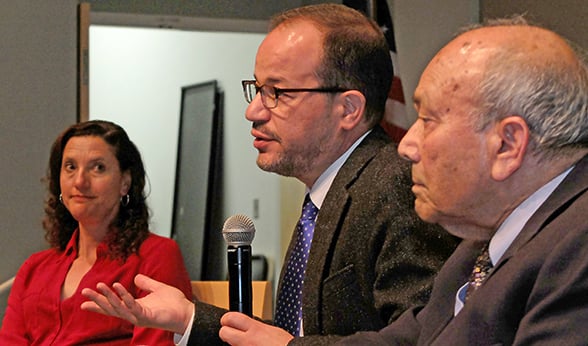World War II came with cruelties the world had never seen. The atrocities committed by medical providers in Nazi Germany permanently shaped present-day medical ethics.
These morals are the foundation for physicians’ duties to protect their patients regardless of when or where they practice. The Center for Bioethics and Humanities at the CU Anschutz Medical Campus hosted a recent event that focused on preserving this morality, and how it is being challenged in present day.
‘Demanding morality’
The event, “Medicine and Morality in Times of War,” was attended by about 125 faculty, staff, students and members of the general public. It was part of a larger 2019 Holocaust Genocide and Contemporary Bioethics (HGCB) program, which comprised of nine events across all four CU campuses during the federally designated “Week of Remembrance of the Victims of the Holocaust,” April 29 to May 3. The CU Center for Bioethics and Humanities has been hosting the program since 2016.
The event began with a haunting musical performance by two members of the Anschutz Campus Orchestra, and was followed by opening remarks by Matt Wynia, MD, MPH , director of the Center for Bioethics.
“Every topic in bioethics is affected by the nationalist, socialist regime in Nazi Germany,” he said. “It is a long painful shadow. This program is intended to bring forth the legacy of healthcare in the Holocaust and how it still affects how we think about so many aspects of bioethics.”
 Speakers at the event included, from left, Janine Young, Zaher Sahloul and Ved Nanda.
Speakers at the event included, from left, Janine Young, Zaher Sahloul and Ved Nanda.
William Silvers, MD, followed up with words of thanks for the continuation of the Holocaust Remembrance week programming at CU Anschutz, and Rabbi Joseph Friedman of DAT Minyan gave a foreword of solemn praise.
“In times of war, the law falls silent,” Friedman said. “Conversations that are happening in this room are meant to ensure that the world demands morality.”
‘A stain on humanity’
Two national leaders in international human rights each gave a 20-minute talk highlighting current ethical issues and how they juxtapose with the Holocaust. These presentations were followed by two local experts offering 10-minute commentaries as panel respondents.
The first speaker, Zaher Sahloul, MD, is a Syrian-American physician who has witnessed doctors in his native Syria committing war crimes. He has run multiple medical relief missions into Syria and along its borders to aid civilians and refugees. At times he worked underground to decrease his chance of being bombed by a regime run by his former medical school classmate, Bashar al-Assad.
“Medical facilities cannot be built because they are specifically targeted,” he said of his experience treating patients in Syria. “ ‘Never again’ is happening again and again. We need to pay attention and stop the atrocities happening across the world. It is a stain on our humanity.”
Len Rubenstein, JD, gave the second talk. A professor at Johns Hopkins University who has spent two decades engaged in research and advocacy concerning the protection of medicine and medical ethics in war, he gave specific examples of how the values that came from WWII have started to erode.
“Following the war, it was declared that providers should treat a patient regardless of their political affiliation,” he said. “Suffering people across the world have started to lose access to care because providers don’t want to be associated with terrorism, a word that is very loosely defined in the eyes of the law. We have to go back to the principle of humanity.”
‘Thoughtful responses to moral dilemmas’
The first respondent, Janine Young, MD, called attention to the refugee crisis and how it could mirror how Jewish refugees were treated.
“We’re affecting entire generations of children,” said Young, citing her experience as medical director of the Refugee Clinic and co-founder of the new Human Rights Clinic at Denver Health. “We need to recognize them as humans who came here for a better life.”
She works with many patients in Colorado who have been displaced by the Syrian Civil War and other conflicts in Latin America, Africa and Asia, providing direct clinical care, developing medical screening guidelines, performing research and advocating for undocumented immigrants.
The second respondent, Ved Nanda, MA, LLB, LLM, namesake of the Ved Nanda Center for International and Comparative Law at the University of Denver highlighted specific hardships that physicians face in war-torn countries.
“Doctors are victims,” he said. “They are targeted, along with hospitals and ambulances. These acts are committed by governments and the people who are fighting them, all over the world.”
The closing panel discussion featured all four speakers on stage fielding questions from the audience and explored the delicate interconnectivity of global politics and medicine.
“We have to take care of the vulnerable,” said Sahloul. “We have a responsibility as providers to uphold this morality through the test of time.”




